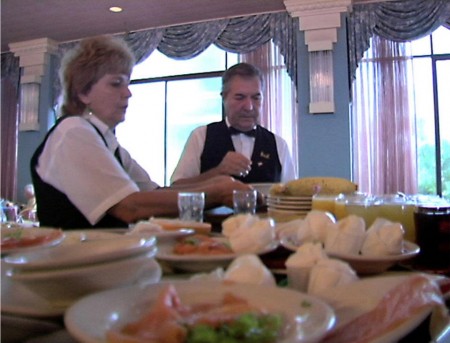
by Amy Stone
Reporting back from the New York Jewish Film Festival: But would you go there? ‘Welcome to Kutsher’s: The Last Catskills Resort’
(The New York Jewish Film Festival, presented by The Jewish Museum and the Film Society of Lincoln Center,ended Jan. 26. Look for these films at other festivals and, hopefully, in commercial distribution.)
 What does it say about the state of American Judaism that the New York Jewish Film Festival’s final offering was the documentary “Welcome to Kutsher’s: The Last Catskills Resort”? Sad to say, we are talking the resort of last resort.
What does it say about the state of American Judaism that the New York Jewish Film Festival’s final offering was the documentary “Welcome to Kutsher’s: The Last Catskills Resort”? Sad to say, we are talking the resort of last resort.
The Kutsher’s story testifies to the drive and determination that made Kutsher’s a piece of Jewish Americana for more than a century. This is the tale of three generations of Kutshers who oversaw the rise and watched the demise of the resort formula they perfected. Three meals a day – all the kosher food you could eat; free, top-flight entertainment; fun for the whole family; and the Kutsher niche – famous athletes on staff.
There was plenty of room for strong women in the Kutsher family. In 1907, Louis and Max Kutsher and Max’s wife, Rebecca, had saved enough money as tailors on the Lower East Side to buy farmland in Sullivan County in upstate New York. Like other Jewish farmers, they took in boarders from the Lower East Side. When guests turned out to be more profitable than chickens and cows, the Jewish resort business was born, responding to working-class Jews finally able to afford vacations but barred from gentile-only resorts.
The second generation Mrs. Kutsher was a true partner in turning Kutsher’s Farm House into Kutsher’s Country Club. Milton and Helen Kutsher married in 1946 and by the 1950s, Milton was taking major business risks to expand Kutsher’s to more than 1,000 acres and create a luxury resort growing so fast guests were signed up for facilities before they were built.
The heroes of the film are Helen Kutsher and son Mark. This was truly a family operation. As Mark says of his mother, “She could be in a mink coat and pick up a gum wrapper two bellboys had left for the night porter.” And it was a family operation with heart. When asked if a certain waiter was still there after 30 or 40 years, Helen Kutsher’s reply was, “Of course. He doesn’t have anywhere else to go.”
Husband-wife filmmakers Ian Rosenberg and Caroline Laskow have preserved a lot of Kutsher’s history – though they were called to task at the film festival world premiere for not including Kutsher’s as the great Jewish singles mating ground.
The film is bookended with jokes by Freddie Roman, whose humor is, putting it politely, crude. Why mourn the end of Borscht Belt comedians when you can get more timely tasteless humor on “South Park”?
But how can you preserve a once glorious institution when no one wants to go there?
Kutsher’s is still offering a kosher Passover but the family no longer runs the place. Mother and son continue to hope that legalized gambling will spark a rebirth of the Catskills resorts. Meanwhile, they see the form of fun the Catskills resorts invented — unlimited food and family entertainment, everything included — taken over by the cruise business. If only Kutsher’s could be converted into a gigantic floating resort with a responsible Kutsher captain at the helm.
But the younger generation jumped ship. Instead of sticking around the dying resort business, Mark’s son, Zach, plus partners recently opened Kutsher’s Tribeca in Manhattan’s trendy lower west side. No mention of kosher on the menu.
As for the New York Jewish Film Festival’s closing with “Welcome to Kutsher’s: The Last Catskills Resort”: Since there’s no way Kutsher’s could fit into a time capsule or be captured in a museum exhibit, it’s fortunate that we Jews like to get our heritage at the movies.